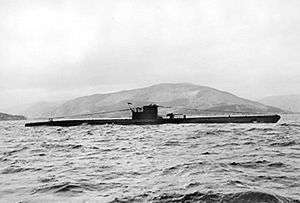German submarine U-1057
 U-570 Type VIIC submarine that was captured by the British in 1941. | |
| History | |
|---|---|
| Name: | U-1057 |
| Ordered: | 5 June 1941 |
| Builder: | Friedrich Krupp Germaniawerft AG, Kiel |
| Yard number: | 691 |
| Laid down: | 21 June 1943 |
| Launched: | 20 April 1944 |
| Commissioned: | 20 May 1944 |
| Fate: | Surrendered on 9 May 1945 |
| General characteristics | |
| Class and type: | Type VIIC submarine |
| Displacement: |
|
| Length: |
|
| Beam: |
|
| Height: | 9.60 m (31 ft 6 in) |
| Draught: | 4.74 m (15 ft 7 in) |
| Installed power: |
|
| Propulsion: |
|
| Speed: |
|
| Range: | |
| Test depth: |
|
| Complement: | 4 officers, 44–52 enlisted |
| Armament: |
|
| Service record | |
| Part of: |
|
| Commanders: | |
| Operations: | 1 patrol |
| Victories: | None |
German submarine U-1057 was a Type VIIC U-boat of Nazi Germany's Kriegsmarine during World War II.
She was ordered on 5 June 1941, and was laid down on 21 June 1943 at Friedrich Krupp Germaniawerft AG, Kiel, as yard number 691. She was launched on 20 April 1944 and commissioned under the command of Oberleutnant zur See Günther Lüth on 20 May 1944.[2]
Design
German Type VIIC submarines were preceded by the shorter Type VIIB submarines. U-1057 had a displacement of 769 tonnes (757 long tons) when at the surface and 871 tonnes (857 long tons) while submerged.[3] She had a total length of 67.10 m (220 ft 2 in), a pressure hull length of 50.50 m (165 ft 8 in), a beam of 6.20 m (20 ft 4 in), a height of 9.60 m (31 ft 6 in), and a draught of 4.74 m (15 ft 7 in). The submarine was powered by two Germaniawerft F46 four-stroke, six-cylinder supercharged diesel engines producing a total of 2,800 to 3,200 metric horsepower (2,060 to 2,350 kW; 2,760 to 3,160 shp) for use while surfaced, two AEG GU 460/8-276 double-acting electric motors producing a total of 750 metric horsepower (550 kW; 740 shp) for use while submerged. She had two shafts and two 1.23 m (4 ft) propellers. The boat was capable of operating at depths of up to 230 metres (750 ft).[3]
The submarine had a maximum surface speed of 17.7 knots (32.8 km/h; 20.4 mph) and a maximum submerged speed of 7.6 knots (14.1 km/h; 8.7 mph).[3] When submerged, the boat could operate for 80 nautical miles (150 km; 92 mi) at 4 knots (7.4 km/h; 4.6 mph); when surfaced, she could travel 8,500 nautical miles (15,700 km; 9,800 mi) at 10 knots (19 km/h; 12 mph). U-1057 was fitted with five 53.3 cm (21 in) torpedo tubes (four fitted at the bow and one at the stern), fourteen torpedoes or 26 TMA mines, one 8.8 cm (3.46 in) SK C/35 naval gun, 220 rounds, and an anti-aircraft gun. The boat had a complement of between 44 — 52 men.[3]
Service history
On 9 May 1945, U-1057 surrendered at Bergen, Norway. She was later transferred to Loch Ryan, Scotland on 2 June 1945.[2]
The TNC allocated U-1057 to the Soviet Union. On 4 December 1945, she arrived in Libau, Latvia, as British N-class N22. On 13 February 1946, the Soviet Navy allocated her to the Baltic Fleet. She was renamed S-81 on 9 June 1949 then sent to the reserve fleet on 30 December 1955. S-81 went to the Northern Fleet as a test hulk and was later sunk in the Barents Sea on 24 September 1957, during an atomic bomb test off of Novaja Zemlja. She was struck from the Soviet Navy on 16 October 1957 and broken up for scrap.[2]
References
Bibliography
- Busch, Rainer; Röll, Hans-Joachim (1999). German U-boat commanders of World War II : a biographical dictionary. Translated by Brooks, Geoffrey. London, Annapolis, Md: Greenhill Books, Naval Institute Press. ISBN 1-55750-186-6.
- Busch, Rainer; Röll, Hans-Joachim (1999). Deutsche U-Boot-Verluste von September 1939 bis Mai 1945 [German U-boat losses from September 1939 to May 1945]. Der U-Boot-Krieg (in German). IV. Hamburg, Berlin, Bonn: Mittler. ISBN 3-8132-0514-2.
- Gröner, Erich; Jung, Dieter; Maass, Martin (1991). U-boats and Mine Warfare Vessels. German Warships 1815–1945. 2. Translated by Thomas, Keith; Magowan, Rachel. London: Conway Maritime Press. ISBN 0-85177-593-4.
External links
- Helgason, Guðmundur. "Patrols by U-1057". German U-boats of WWII - uboat.net.